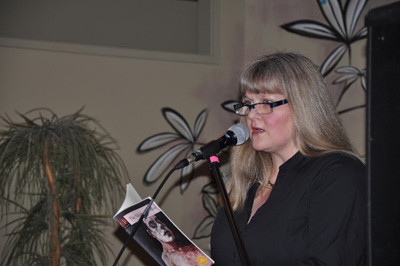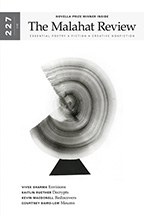A Conversation With a Friend:
Rhonda Ganz
 Rhonda Ganz has been a Friend of The Malahat since our little group began in January, 2010. Malahat volunteer Julie Bartusek interviewed her for this edition of Malahat lite.
Rhonda Ganz has been a Friend of The Malahat since our little group began in January, 2010. Malahat volunteer Julie Bartusek interviewed her for this edition of Malahat lite.Why did you decide to become a Friend of The Malahat?
I think they’re the best literary magazine out there. The fact that I live in Victoria where they produce it and get to know some of the people - I couldn’t not get involved. One of my favorite things to do is to go to Planet Earth Poetry and Malahat issue launches. It’s made the magazine accessible in a completely different way.
What do you enjoy about the Friends group?
I like the newsletters, the Malahat lite. I tend to live on my computer, because of my work, so there’s no waiting time to receive my emails. Also, they’ve put on a couple seminars already, such as the one John ran last year about submitting (Best Foot Forward: How to Enter the Literary Conversation). It was packed; it was great. It’s the way it expands the poetic community. It’s a social thing as well. I try to do as much as I can and that just offers more opportunities, especially hearing and reading writers that don’t show up to Planet Earth Poetry. If it wasn’t for The Malahat letting me know, I would miss out on that. They also help add to my education. Friends of The Malahat get free books and free entries to events too.
As a freelance editor, do you find it difficult to find time to write?
Yes, there are so many things I would like to do in addition to writing. But I think of myself as a poetic editor, even when editing a report. There needs to be some internal rhythm. Sometimes I’ll just change around what I’ve been given because it just sounds awkward. You can read it on the page and think: if they just switch this around a little bit. I guess the sound of poetry is always in my head even when I’m editing technical or business documents. Editing is 30% of what I do. I do graphic design too. It’s a different part of the brain from the writing part. All these competing interests. I just took a collage workshop because I’m interested in how colour goes together as well as how words can go together. So there’s never enough time. You have to portion it out in a way that makes sense to you.
You are participating in the August Poetry Postcard Fest . It sounds like an exciting experience. Does this help you with your work?
Yes, my first assignment of the day now is to write a poem every morning. Without that direction, do I do it on my own? Not very often. But once you know there is a project, with nearly a hundred people doing it this year, there is this commitment to follow through.
How does the Postcard Fest help you with your other work?
Theoretically you’re supposed to write on the back whatever comes out. I think I’m getting there, but since my normal method is to spend weeks and days, and sometimes months writing a line here or there, I still write it on a separate piece of paper. Just to see how long it is. I want to know it’s going to fit. There’s nothing worse than starting to write a poem and you don’t have enough room on the postcard to tie it up. I’m not a purest. The idea is to be spontaneous and whatever comes out of you comes out. You just put it on the card and let it be. I think it’s progress to write it in a half hour and transcribe it on to the postcard. I’m not following the rules, but for me it’s a big departure. Helps me be spontaneous. And I get inspired by the postcard, you know, by whatever I’m in the mood for.
Do you have a process?
Poetry just needs your brain, whereas art needs physical tools. I think that’s why I started writing. I write in my head a lot and eventually it ends up on paper. People talk about how they have to write their way out of a poem and I have to write my way into a poem because I already know how it’s going to end first. So I have to find my way to get to that ending and that’s not always the case, but it’s very very often the case. I know how to finish the last line, but it doesn’t always stay as the last line. Or I’ll have a title that I like which I know will not work inside a poem as a line. But that’s what I love about titles, they don’t really have to relate to the poem. The words create an image for me. I’m not a very descriptive poet and I’m not a nature poet. I don’t write about nature. It’s a lot about relationships. It’s not that they might not happen in a landscape; it’s usually about the person. So there is usually some sort of narrative trying to get the arc of the person’s life.
You’ve been a finalist in the Malahat poetry contests (most recently the 2012 Far Horizons Award for Poetry and the 2011 Open Season Awards in Poetry) and have recently been published (in issue #177, Winter 2011). How often do you submit?
Quite a bit recently. Apart from contests that come my way, the Malahat was my first real submission. I said to myself, “OK, I’ve got to start submitting.” I’ve been reading for four or five years. I read all over the place. But I wanted to get published, and I was so thrilled to be published by The Malahat because that was on my list. I’ve been published in Rocksalt: An Anthology of Contemporary BC Poetry and a few other anthologies. I’ve submitted to a couple special issues, such as theme issues. I sent one into Arc and it wasn’t accepted, but it just sorta steers my poetry. I did another two last night, but it was to get my subscription for another magazine and they offer a prize. Entering contests is a good way to get your subscription and if you’re shortlisted, that’s just a bonus.









